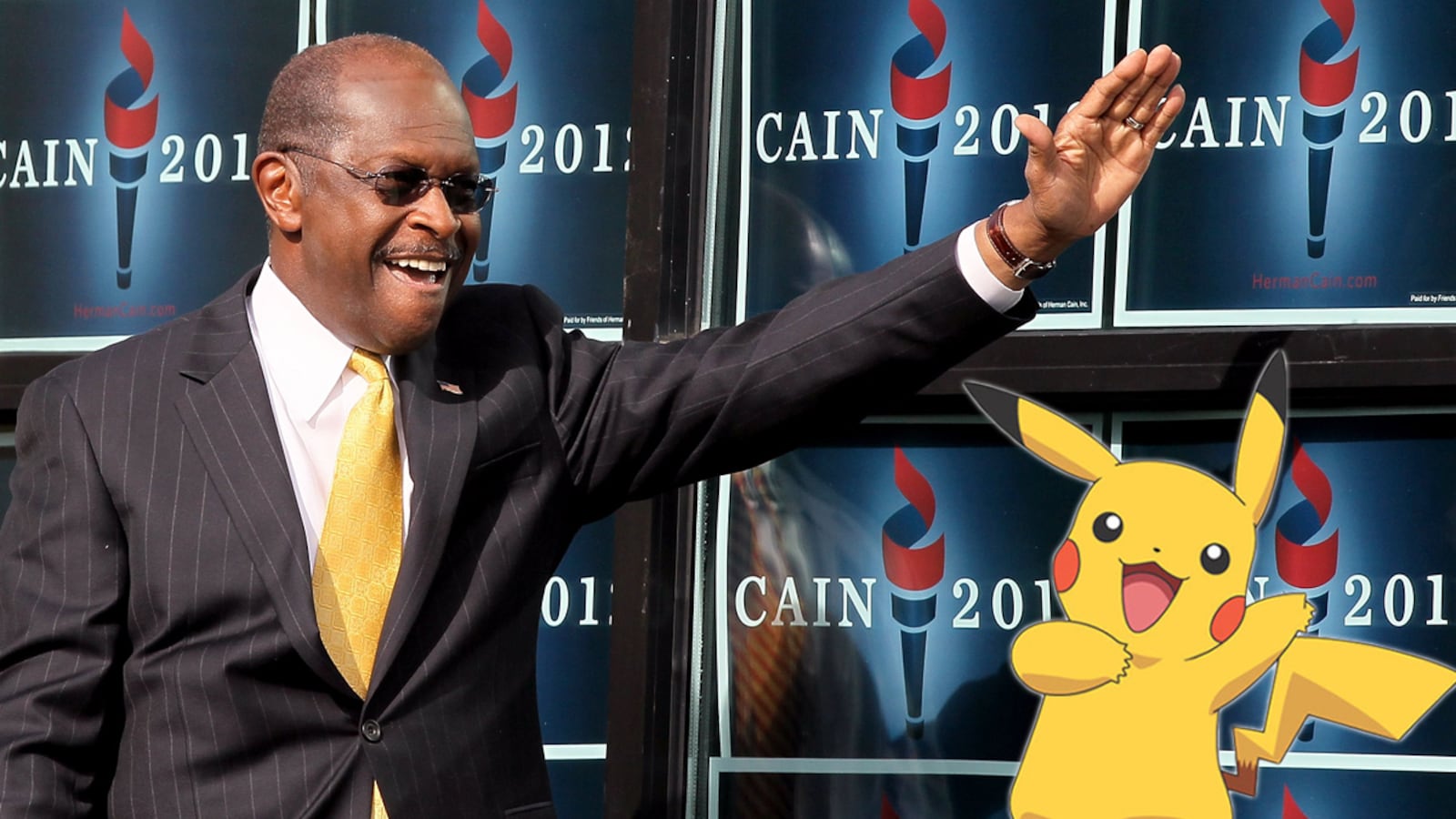Presidential candidates usually like to go out with a bang rather than a whimper. It can be, after all, the way their entire campaign is remembered.
A politician can impart one final inspirational message to disappointed supporters—like Hillary Clinton’s parting words during the 2008 campaign, when she said, “Although we weren't able to shatter that highest, hardest glass ceiling this time, thanks to you, it's got about 18 million cracks in it.” More resentful words can be equally memorable. Although he rebounded to win the presidency six years later, Richard Nixon’s valediction after losing the 1962 California gubernatorial race forever cemented his image as bitter and angry: “You won't have Nixon to kick around anymore, because, gentleman, this is my last press conference."
Then there’s Herman Cain: He quoted Pokémon: The Movie 2000.
Closing a rambling press conference in Atlanta where he announced the suspension of his bid for the GOP presidential nomination, Cain said, “I believe these words came from the Pokémon movie. ‘Life can be a challenge. Life can seem impossible. It’s never easy when there’s so much on the line. But you and I can make a difference. There’s a mission just for you and me.’” The verses he cited are from the song “Power of One,” by the disco singer Donna Summer, which was the theme of the 1999 movie.
The words had become something of a mantra for the Cain campaign, the song that had become an unofficial second theme song—behind Krista Branch’s Tea Party anthem “I Am America” (that’s the soaring music heard at the end of Cain’s infamous ad that featured campaign manager Mark Block smoking a cigarette.)

The former restaurant executive been quoting the “Power of One” since the beginning of his campaign: when he kicked things off in Atlanta in May, saying the words came from the closing song of the 2000 Olympics. He used them again in July at the Republican Leadership Conference in New Orleans.
But that it came from a song only came to light in August, when during a debate Cain said, “A poet once said, 'Life can be a challenge, life can seem impossible, but it's never easy when there's so much on the line.'" Curious Googlers soon found that it wasn’t a poet but a disco siren who had authored the words, and that they came from the anime movie.
When pushed on where he’d heard Summer’s song, Cain didn’t take it well. He insisted he hadn’t been watching Pokémon videos (perhaps the most credible of his denials in recent weeks), but wasn’t clear on where exactly he might have heard the lyrics.
The pizza man finally came clean during an interview published in the December issue of GQ. “I heard the song in a collage that NBC put together following the 2000 Olympics,” he explained. “And as it turns out, the song comes from the Pokémon movie, and I didn't know that.”
So the mystery of how he’d come across the song, and why he mistakenly attributed it to the 2000 Olympics, was solved. But why would be use the lyrics in what could be his political last words? According to IMDB, the film tells the story of how "Ash Ketchum must gather the three spheres of fire, ice and lightning in order to restore balance to the Orange Islands."
But the whole thing is a classic Cain move—and one that fittingly sums up his campaign. Of course, there’s the neat symmetry of starting the campaign in Atlanta with the quote and ending it in the same city, with the same lines, but the resonances go deeper.
Throughout the campaign, Cain repeatedly reached for snappy, glib, inspirational phrases—often, it seemed, without having thought them through. It was apparently the legacy of his years as a motivational speaker, a sector in which empty but punchy quotes are the coin of the realm and are seldom quarried for their original source.
For example, Cain’s 9-9-9 plan caught on with conservative voters, but was widely derided by economists on both the right and the left—and it quickly became clear that Cain had no real understanding of how revenues would line up with the status quo, nor of how regressive the tax would be. But that didn’t stop him: he was soon on his heels, offering half-baked notions of exemptions for the poor. The Summer quote was really no different—Cain heard something, liked it, and went with it, only to become a laughingstock once voters and the press took a closer look.
Moreover, Cain’s obstinate use of the phrase on his way out the door is emblematic of his disdain for media and political elites. When proven wrong, Cain repeatedly thumbed his nose at critics, admitting he was incorrect but saying it didn’t matter or else continuing to say it anyway. In November, he worried publicly that China was developing nuclear weapons. When reminded that they already them, he was unrepentant: "I would say to them, do you think I'm dumb enough not to study up on these issues? I have been studying on these issues for months." How that squared with his original misstatement was never clear.
When ending his speech Saturday, Cain once again did it his way: even with acknowledging the source for his quote, he still proudly recited it. As with so much of his campaign, it was cringe-worthy, kind of crazy, and unintentionally humorous. But it was unmistakably Herman Cain.





